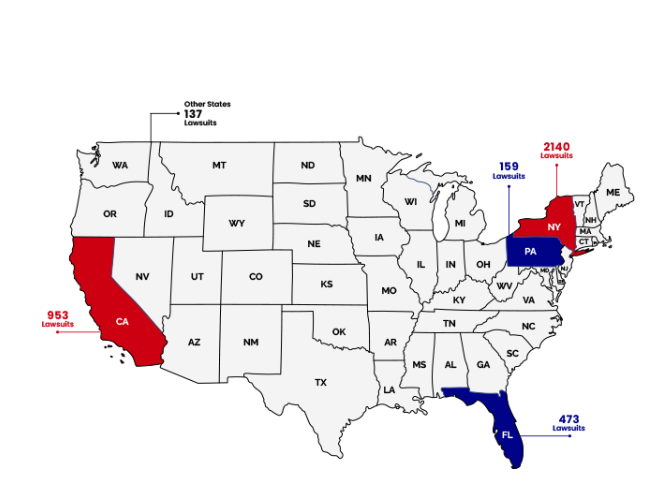In today’s digital age, the importance of having an ADA Compliance website cannot be overstated. As the owner of EcomBack, I’ve witnessed firsthand the evolution of web accessibility standards and their growing importance in creating an inclusive online environment. This is where the role of web development platforms in ensuring ADA (Americans with Disabilities Act) compliance comes into play. The Annual 2023 ADA Website Accessibility Lawsuit Report provides invaluable insights into the current landscape of web accessibility and the legal implications of non-compliance. Let’s dive into why ADA compliance is crucial and how web development platforms are key in achieving it.
Understanding ADA Compliance
ADA compliance refers to the Accessibility Guidelines that websites need to follow to make their content accessible to people with disabilities. This includes ensuring that individuals with disabilities, such as visual, auditory, physical, speech, cognitive, and neurological disabilities, can navigate, understand, and interact with the Web. With the digital realm becoming an integral part of our daily lives, ensuring web accessibility is not just a legal requirement but a moral imperative.
The Surge in Accessibility Lawsuits
Recent years have seen a significant rise in ADA compliance lawsuits, highlighting the legal risks businesses face when their websites are not accessible. The Annual 2023 ADA Website Accessibility Lawsuit Report by EcomBack sheds light on this trend, illustrating the need for businesses to prioritize web accessibility. The report reveals that failing to comply with ADA guidelines not only impacts a company’s reputation but also poses substantial financial risks due to potential legal actions.
The Critical Role of Web Development Platforms
Web development platforms are at the forefront of the fight for web accessibility. These platforms provide the tools and frameworks necessary for creating websites that meet ADA compliance standards. From customizable templates to accessibility widgets, these platforms offer a range of features designed to make websites more accessible to users with disabilities.
Implementing Best Practices for ADA Compliance
Achieving ADA compliance involves several best practices that web development platforms can facilitate, including:
- Text Alternatives: Providing text alternatives for any non-text content so that it can be changed into other forms people need, such as large print, braille, speech, symbols, or simpler language.
- Keyboard Accessibility: Ensuring that all functionalities are accessible via a keyboard for users who cannot use a mouse.
- Sufficient Contrast: Ensuring that text and background colors contrast sufficiently for users with visual impairments.
- Navigation Consistency: Making navigation consistent throughout the website to help users understand where they are and how to navigate to different sections.
- Error Identification and Recovery: Providing error identification and recovery options for users who encounter input errors.
The Impact of Non-Compliance
Non-compliance with ADA standards can have far-reaching consequences for businesses. Beyond the legal implications highlighted in the Annual 2023 ADA Website Accessibility Lawsuit Report, there are other considerations. Websites that are not accessible limit the ability of individuals with disabilities to engage with online content, resulting in a loss of potential customers and negatively impacting the overall user experience. This can lead to decreased customer satisfaction and loyalty, ultimately affecting the bottom line.
EcomBack’s Commitment to Web Accessibility
At EcomBack, we are committed to promoting web accessibility and ensuring that our clients’ websites meet ADA compliance standards. We leverage the latest web development platforms and technologies to create websites that are not only visually appealing but also accessible to everyone. Our team stays abreast of the latest guidelines and best practices in web accessibility to ensure that we provide our clients with the best possible solutions.
Conclusion
The role of web development platforms in ensuring ADA compliance is more critical than ever. As highlighted in the Annual 2023 ADA Website Accessibility Lawsuit Report, businesses must prioritize web accessibility to mitigate legal risks and foster an inclusive digital environment. By leveraging the capabilities of web development platforms and adhering to best practices, businesses can ensure their websites are accessible to all users, regardless of their abilities. At EcomBack, we are dedicated to helping businesses achieve this goal, one website at a time.
In conclusion, web accessibility is not just a legal requirement—it’s a fundamental aspect of creating an inclusive and equitable digital world. By understanding the role of web development platforms in ADA compliance and implementing the necessary measures, businesses can ensure their online presence is open to everyone, thereby expanding their reach and impact in the digital space.
Connect with EcomBack
To learn more about ADA compliance and how your business can benefit from an accessible website, visit our Annual 2023 ADA Website Accessibility Lawsuit Report. At EcomBack, we’re here to guide you through every step of making your website accessible and compliant. Let’s create a more accessible digital world together.

